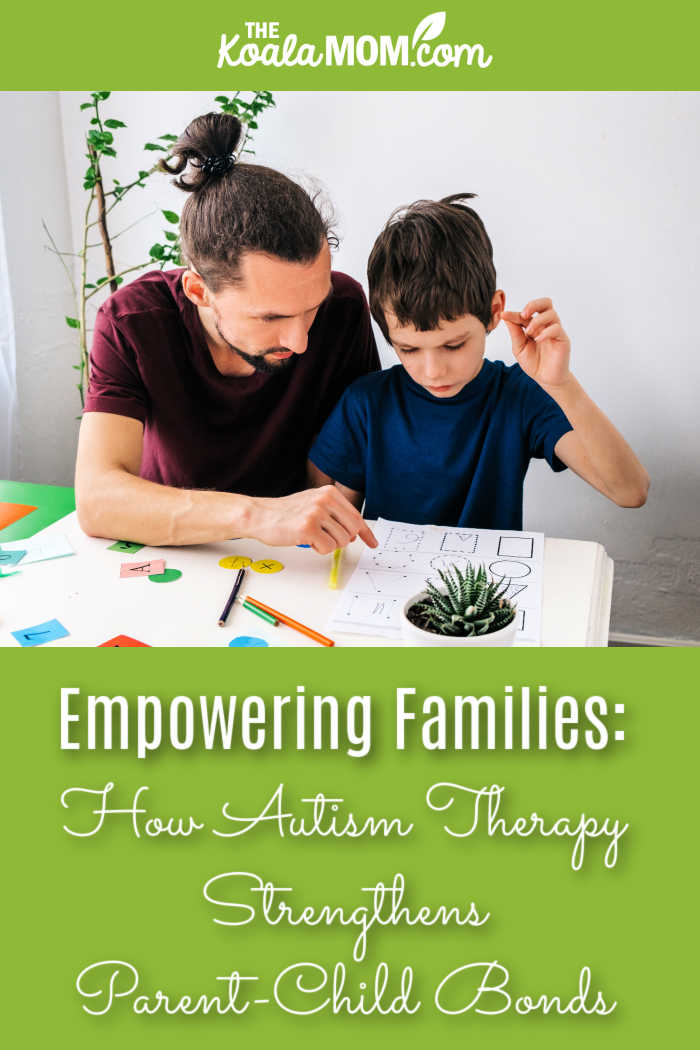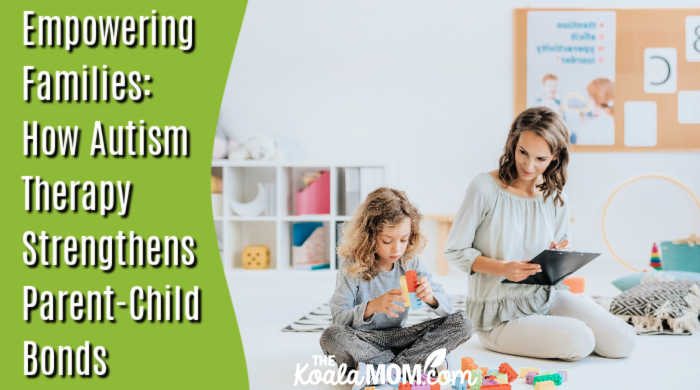Hearing a diagnosis of autism spectrum disorder for the first time can feel intense. Many parents worry about their child’s future and how to support their development. The uncertainty can create stress, but understanding therapy options provides a path forward.
Autism therapy helps children grow while strengthening the bond between parents and their kids. Parent-child relationships thrive with guidance and structure. Therapy teaches practical ways to communicate, manage emotions, and engage in meaningful activities.
These skills enhance daily interactions, turning challenges into opportunities for connection. When families embrace therapy as a shared journey, they build trust, resilience, and a stronger sense of unity. Read on to learn more about how autism therapy strengthens the bonds between parent and child.

Building Trust Through Consistent Therapy
Consistency in therapy provides a sense of stability. Predictable routines help children feel secure; regular therapy sessions provide that structure. Knowing what to expect lowers anxiety, making learning, connecting, and engaging easier. At the same time, parents gain confidence as they see progress unfold.
Active parental involvement strengthens trust. When parents participate in therapy, they gain valuable techniques they can use at home to teach daily living skills. Knowing they’re supported helps children build a sense of security and trust with their parents.
Setting and working toward shared goals fosters connection. Families collaborate with therapists to set milestones and create a team-like dynamic. Every achievement, big or small, is a shared victory that reinforces the joy of growing together.
Clinics that provide ABA therapy for autism understand that each child is different, and building trust with them varies. ABA, or Applied Behavior Analysis, uses positive reinforcement to help children develop independent skills. Younger children in ABA therapy often progress faster since their brains are still highly adaptable.
Enhancing Communication Skills
Many children with autism spectrum disorder communicate in ways that go beyond spoken words. Autism therapy helps parents understand their child’s gestures, expressions, and nonverbal cues. Recognizing these signals strengthens the parent-child bond and helps parents meet their child’s needs.
Different therapy approaches encourage self-expression beyond developing language skills. Art, music, and play-based therapies allow children to express their thoughts and emotions. Consider joining your child in these activities or enrolling them in classes to build social skills. When parents participate, they create a shared language that deepens their relationship.
Parents also refine and develop their own alternative communication skills. Parents learn to adjust their tone, body language, and responses to create a supportive environment. As parents and children communicate more naturally, their bond grows stronger.
Strengthening Emotional Regulation
Therapy helps parents develop emotional regulation skills alongside their children. Staying calm and composed during stressful moments sets an example for the child. When parents show patience, children are more likely to mirror that behavior, leading to a calmer home.
Joint coping strategies build resilience. Deep breathing, mindfulness, and sensory breaks help families manage difficult emotions together. Over time, these shared strategies become second nature, strengthening teamwork in tough moments.
A home should feel like an emotional safe space. Autism therapy helps families process emotions in a way that fosters understanding. When emotions are handled with care, family dynamics improve, and the household becomes a place of comfort and support.
Fostering Shared Activities and Interests
Autism therapy helps parents discover their child’s strengths and interests. Parents can create bonding moments outside therapy by discovering what their child enjoys. Shared hobbies build deeper connections and bring families closer together.
Therapeutic play encourages meaningful interaction. Sensory play, role-playing, and interactive games help children feel connected and at ease. When parents join in, these activities become valuable moments of learning and bonding.
Connecting with support groups expands social interactions. Interacting with other families on similar journeys provides fresh perspectives and encouragement. Shared experiences spark new ideas and strengthen the parent-child connection even further.
Empowering Parents through Education and Resources
Knowledge is a powerful tool for parents. Workshops, courses, and effective therapy sessions provide valuable autism and parenting insights. The more parents learn the better equipped they are to support their child’s growth in meaningful ways.
Community resources offer guidance and connection. Local support groups and online forums allow parents to share experiences and seek advice. Having a strong support system reduces feelings of isolation and provides encouragement in their everyday life.
Advocacy also strengthens family bonds. Learning how to communicate a child’s needs in school and social settings empowers parents to seek the right support. Confident advocacy strengthens family unity, reinforcing the idea of working toward a shared goal.
Celebrating Progress Together
Acknowledging progress—no matter how small—reinforces growth. Each step forward in behavioral interventions builds confidence for both the child and their parents. Celebrating milestones, such as improved motor skills or positive behaviors, keeps motivation high. Whether with kind words or small rewards, let your child know that they’re doing great.
Creating family traditions around progress can be meaningful. A special outing, a fun activity, or a simple acknowledgment at dinner makes achievements feel meaningful. These moments turn hard work into cherished memories.
Reflecting on the journey strengthens appreciation. Looking back on challenges overcome and lessons learned along the way fosters gratitude. Appreciating each other’s efforts builds stronger family bonds and encourages continued growth.
Autism therapy does more than support development. It strengthens parent-child bonds through trust, communication, emotional regulation, shared activities, and education. Therapy provides the structure for building connections. It also helps families address challenges with patience and understanding.
Every family’s journey is unique. The goal remains the same: creating a loving, supportive space where children with autism feel valued. Time spent in therapy strengthens relationships, builds lasting connections, and enhances quality of life. Families grow together, learning from each experience and celebrating every step forward.


2 Comments
Thank you, Bonnie, for addressing autism. I have two children recently diagnosed on the autism spectrum, and I’m only just beginning to learn about the condition. I appreciate the focus on strengthening their emotional regulation, acknowledging and celebrating their progress, building their trust and resilience, reading their non-verbal skills, providing them an emotionally safe environment, etc.
Thanks for your comment. There’s a lot to learn with this diagnosis, but I try to focus on the value of knowing my child better. The diagnosis is simply a tool that helps me understand my child and meet his or her needs, and that is something I want to do for each of my kids. All the best to you in this journey!